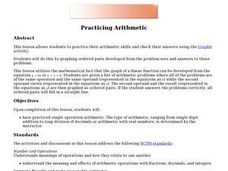Curated OER
Bean toss
Students arrive at a verifiable rule, or set of rules, to handle all addition situations with signed numbers.
Curated OER
Practicing Arithmetic
High schoolers practice single operation arithmetic ranging from single digit addition to long division of decimals or real numbers using Graphit. They use data sets and rules to graph ordered pairs.
Curated OER
3c and 5c Stamps
Students explore multiples of consecutive numbers. Given a real life situation, students devise and use problem solving strategies. Students describe what it means for a sequence to carry on to infinity. They locate patterns in...
Curated OER
Plotting Points
In this middle school mathematics/Algebra I worksheet, students plot points on a coordinate plane. The one page worksheet contains six problems. Answers are not provided.
Curated OER
Can Stack
Students are able to find the rule for summing consecutive numbers;
identify the pattern of triangular numbers. They then solve the given problem using logic and mathematical reasoning.
Curated OER
Addition Review
Students explore the concept of addition as used in the subject of Algebra while reviewing the different methods using a number line. The lesson includes examples for students to use for scaffolding for group work or whole class...
Curated OER
Outbreak!
Students examine the spread of a disease. In this Algebra II/Biology lesson, students collect and analyze data as they simulate the spread of a virus. Students brainstorm ways in which people can help to stop the outbreak of...
Curated OER
Ws and Worms
Students explore problem solving strategies. Given real life problems, students examine the sum of consecutive strings of whole numbers. Students use diagrams and sequencing to solve problems. Students justify their mathematical...
EngageNY
Geometric Sequences and Exponential Growth and Decay
Connect geometric sequences to exponential functions. The 26th installment of a 35-part module has scholars model situations using geometric sequences. Writing recursive and explicit formulas allow scholars to solve problems in context.
EngageNY
Equivalent Rational Expressions
Rational expressions are just fancy fractions! Pupils apply fractions concepts to rational expressions. They find equivalent expressions by simplifying rational expressions using factoring. They include limits to the domain of the...
EngageNY
Secant and the Co-Functions
Turn your class upside down as they explore the reciprocal functions. Scholars use the unit circle to develop the definition of the secant and cosecant functions. They analyze the domain, range, and end behavior of each function.
EngageNY
Percent Rate of Change
If mathematicians know the secret to compound interest, why aren't more of them rich? Young mathematicians explore compound interest with exponential functions in the twenty-seventh installment of a 35-part module. They calculate future...
EngageNY
Integer Sequences—Should You Believe in Patterns?
Help your class discover possible patterns in a sequence of numbers and then write an equation with a instructional activity that covers sequence notation and function notation. Graphs are used to represent the number patterns.
EngageNY
Adding and Subtracting Polynomials
Need a unique approach to adding and subtracting polynomials? A helpful math instructional activity approaches the concept by relating polynomials to base 10. It encourages pupils to see each term as having a specific value,...
EngageNY
Using the Quadratic Formula
What is the connection between the quadratic formula and the types of solutions of a quadratic equation? Guide young mathematicians through this discovery as they use the discriminant to determine the number and types of solutions,...
EngageNY
Dividing by (x – a) and (x + a)
Patterns in math emerge from seemingly random places. Learners explore the patterns for factoring the sum and differences of perfect roots. Analyzing these patterns helps young mathematicians develop the polynomial identities.
EngageNY
Why Call It Tangent?
Discover the relationship between tangent lines and the tangent function. Class members develop the idea of the tangent function using the unit circle. They create tables of values and explore the domain, range, and end behavior of...
EngageNY
Graphing the Tangent Function
Help learners discover the unique characteristics of the tangent function. Working in teams, pupils create tables of values for different intervals of the tangent function. Through teamwork, they discover the periodicity, frequency, and...
Curated OER
Writing Linear Equations in Different Forms
Can your class write linear equations three different ways? Here is a study guide that includes slope-intercept, standard, and point-slope forms. Learners are given the slope and a point on the line, or two points and are asked to write...
West Contra Costa Unified School District
Graph Square Root and Cube Root Functions
Scholars first learn to graph square root and cube root functions by creating a table of values. They then learn how to graph functions from transformation of the graphs of the parent square root and cube root functions.
West Contra Costa Unified School District
Discovering Slope of a Line in Standard Form
From start to finish this skills practice resource provides a way for individuals to explore the standard form equation of a line. Begin with a warm-up, work through the problems, and then discover the relationship between the...
National Security Agency
Partying with Proportions and Percents
Examine ratios and proportions in several real-world scenarios. Children will calculate unit rates, work with proportions and percentages as they plan a party, purchase produce, and take a tally. This lesson plan recommends five...
Curated OER
Adding Integers
Students add integers using a number line. In this algebra lesson, students add one and two digit integers. They compare zero pairs and the addition of integers.
Curated OER
Adding Ten Tiles I
Students practice this problem that needs a certain amount of experimentation (trial and error) to get any answer at all. In the process they practice their basic number facts. However, to get the complete set of answers Students need to...

























